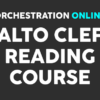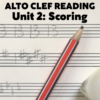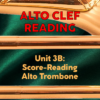Note: originally appeared in the American Composers Forum journal Sounding Board – this version preserves the style and approach of the originally submitted text.
Opportunity
◆ SEPTEMBER 22 (postmark) $$$
The International Society of Distinguished Composers announces their 2002 Composition Competition. Left-handed composers of Icelandic descent who live in the states of Nebraska, Delaware, Louisiana, and the suburbs of Toronto (excluding Midhurst Drive) are invited to submit unperformed and unpublished works for a chamber ensemble to include piccolo, xylophone, celesta, musical saw, and electric bass. Duration: no less than 35-40 minutes in length. Works that exclude one or more instruments will not be considered. Prize: 50,000 oubrados ($150.00 U.S.). The composer will be required to attend the premiere performance in Ulaan Baatar, Mongolia, December 27, 2003 at their own expense. Send nine (9) copies of the score and equivalent recordings on CD only (live instruments must be used – no “computer realizations”). Entry fee: $50 per entry. The winner will be contacted by February 2003. Materials will not be returned.
The other day I received a package in the mail. It was a self-addressed envelope, full of my own compositions and CDs. I had to think about it for a minute – what contest or award or opportunity was this from? There was no enclosed letter of thankful regret, no supportively forlorn message of rejection, not even a blunt dismissal of the contents. It was just a bounce-back of a submission I’d made long ago and had forgotten all about.
It got me thinking about the enormous variety of “Composer Opportunities” offered in the back pages of composer journals, and the equally various ways in which those who offer such opportunities treat their entrants. It occurred to me that the quality of treatment and professionalism inherent in each opportunity’s presentation and administration dictates, to a degree, the quality of submission they are to expect. In other words, you get the kind of score that you deserve.
Composers, like elephants, have long memories. An annual competition that has demonstrated carelessness or downright rudeness in the past can expect a falling-off of worthy composers’ participation. Talk gets around, and the world of composition is a small one. Eventually that contest is liable to receive only the submissions of rank beginners or the truly desperate. When a contest fails to award a first prize, one may well speculate why all of the prize-worthy failed to send anything in that year. The answer is unlikely to be that they wanted to give someone else a shot at it.
The best opportunities are the ones in which the entrants are treated as equals by the judges. This involves a lot of thought in “doing unto others,” especially where administrators may be unaware of the treatment that composers expect, and what their unique sensibilities may be. To assist future providers of grants, awards, contests, etc., here is a set of rules that should be honored to insure the maximum quality of participation and understanding from composers. Note that these are often unspoken or instinctive touchstones for serious composers, who will automatically dismiss reading an announcement and move on to the next one if they see a violation.
GOSS’S GOLDEN RULES
for Composer Opportunities
1. State guidelines clearly and thoroughly.
2. Don’t request scores “On Spec.”
3. Commit to examining and processing every submission equally.
4. Return rejected submissions in a timely and courteous fashion.
5. Allow a reasonable deadline from the time of the announcement.
6. Avoid entry fees when at all possible.
7. Entry fees should NEVER be used to fund cash awards.
8. Restrictions of age, race, achievement, region, and gender must be justifiable.
9. Offer an incentive that respects the composer’s effort.
10. Remember that Every Composition Is Sacred, whether prize-winning or not.
1. State guidelines clearly and thoroughly.
This should seem straightforward enough, but it boggles me to think of how many opportunity notices seem to lack the most basic details. I’ve entered contests which returned my materials because I was the wrong age, or didn’t send a recording, or missed the deadline, and in every case the negative factor was either misstated or omitted from the announcement. If you want a recording, say so in plain English. If you want composition samples, state how many and how long each should be.
2. Don’t request scores “On Spec.”
This is a subtle but potent determination. When a contest requests a score that is unpublished, unrecorded and/or unperformed, it could mean one of two distinct things. The first is that there are a lot of works out there that are suffering neglect, and they deserve a shot. Well and good. But what always sends up an established composer’s antennae is the possibility that the contest is really just an attempt to get them to practically give away that for which they should be paid serious money. If the requested submission is for weird instruments or for full orchestra, the burden on the composer is extremely unfair – that of being asked to dedicate months of effort on the off-chance of some momentary recognition; and then being left with a score which is quite possibly unusable for any other situation. Don’t expect many topnotch submissions for your request of a complete score of a 30-minute concerto for bass clarinet and gamelan ensemble.
3. Commit to examining and processing every submission equally.
When one composer gets a polite letter of refusal and another composer just gets his stuff back and yet a third never gets any notice at all, all from the same contest, the suspicion is high that the administration of the same just ran out of time or interest. If you’re going to hold a contest, expect many many scores. Treat the best as well as the worst, listen to every CD and look at every score you get, and don’t be blinded by anyone’s glittering bio.
4. Return rejected submissions in a timely and courteous fashion.
I have received scores back as late 2 and 1/2 YEARS after the supposed announcement of acceptance/rejection, with no explanation. That organization, a well-respected local orchestra, will never get another manuscript from me unless the conductor personally requests it. Always include a polite and supportive letter of rejection, manners mean everything in this business. And return every score that was sent with a SASE, even if you lost the envelope.
5. Allow a reasonable deadline from the time of the announcement.
For whatever reason, many opportunities time their announcements so that the deadline is a few short weeks away. Some announcements, like those placed in ACF’s sounding board, actually reach the composer AFTER the deadline has passed if the composer is getting their issue third-class mail. This is not only inconvenient, it’s just plain nuts. If you think you’re getting better scores by giving the composer 14 days to send you something, you’re wrong.
6. Avoid entry fees when at all possible.
An entry fee is a slap in the kisser with a wet herring. No one is more aware of how much of a favor they are doing you than the composer who has written their entry for free. Don’t compound the felony by asking for 20 bucks unless you really, absolutely, positively require it in order to administrate your contest.
7. Entry fees should NEVER be used to fund cash awards or pay judges.
It sounds like a simple idea. “Hey, let’s offer a $500 prize. If we charge an entry fee of 10 bucks, then we only need 50 entrants in order to have the prize money. And if we get 500 entrants, we can use the extra money for mailing, hiring a secretary, maybe even go out to lunch.” Uh-uh. The only appropriate and ethical use for an entry fee is in processing the entry. That means you can hire someone to man the mailroom, but you shouldn’t ever use the money to fund the prize. This is not a lottery. As to using entry fees to pay your judging panel, consider the composer’s perception that the contest is doing more to benefit the pocket of an adjudicator than it will ever do for the advancement of contemporary music. It’s a perception that’s often true – especially when the composers who are running the contest use the funds to pay musicians to play a program of their own works alongside that of the prizewinner.
8. Restrictions of age, race, achievement, and gender must be justifiable.
It is becoming harder and harder these days to find examples of institutional discrimination or underprivileged status in the arts. Woman composers and musicians are plentiful, in many communities outnumbering their male counterparts. My own composer friends are young, old, black, white, Asian, Hispanic, female, male, straight, and gay – and not just because I live in San Francisco, okay? So why think you’re doing anyone a favor by having a contest that includes some and not others? Explain your reason in the opportunity announcement, and make it a good one.
9. Offer an incentive that respects the composer’s effort.
This is basic. Check out the Meet The Composer Commissioning Guidelines. http://www.mattsmall.org/CommBasicGuide04.pdf A real award should actually be greater, not lesser, than the stated amounts. Otherwise, we’re back at Rule 2, and the composer is giving his work away for a song. Ultimately, a contest should be awarding composers for their professionalism, and much credibility is gained by the organization’s real awareness and concern for the composer’s professional condition. In other words, offer something real, more than just a pretty certificate to hang on the wall and plane fare to the premiere.
10. Remember that Every Composition Is Sacred, whether prize-winning or not.
As obvious as this seems, it’s all too easy to forget when you’re looking at a stack of entries ten feet deep. But always remember that the act of adjudicating and awarding artistic effort bears no comparison to the creative act itself. Each moment of inspiration that led to a composition was an individual revelation, and deserves the highest respect that you are able to give. Instead of dreading the task of “plowing through” heaps of entries, why not see it as an opportunity to experience the wonderful variety and ingenuity of which the human mind is capable? If the latter isn’t a significant factor in the offering of the opportunity, you might as well just not offer it at all.
In Conclusion…
To every list of rules, there are always exceptions. What about performance opportunities, where an ensemble is putting out a call for manuscripts, but not offering prize money? Perhaps Rule 9 may not apply, but certainly every other rule does. A contest for young Native American composers? Sounds great, obey Rule 8 and tell us why you’re interested in helping them – maybe I’ll even donate to your organization. Your organization has a yearly budget of $900? Okay, you can disregard rule 6, but watch out for rule 7!
The finest and fairest way to treat a composer is not to ask for a prize-winning composition at all, but rather for work samples, from which a determination can be made as to whom to COMMISSION for a new work. The happiest results are nearly always collaborations between composers and performers, and this strategy allows for the communication that a score submittal does not. It also brings dignity and good will to the process, as seen in opportunities such as the ACF’s Continental Harmony.
The most important thing to remember is this: you are being judged, just as surely as you judge the entrants. For composers are also adjudicators. They themselves must sift the bewildering array of opportunities that are presented to them, just as a panel must delve into a stack of scores. And those composers with the kind of experience and quality that would deserve a prize are quite aware of what opportunities are just a waste of hope, time, and postage. Don’t be one.
Opportunity
◆ NO DEADLINE $$$
Accomplished Composer/Writer announces the Thomas Goss Composition Opportunity 2013. Major symphony orchestras and chamber ensembles are invited to offer commissions for extended works on any theme or genre for performance in their 2014-2015 season (see ASCAP Composer Commissioning Guidelines for appropriate fees). Prize: Attendance of premiere by composer and possible 3-year residency (salary negotiable). Send scores and recordings of contemporary works performed in recent seasons – applicants that show a strong commitment to new music will receive highest consideration. Entry fee: Dinner at Chez Panisse. For more information, contact Thomas Goss at [email protected].








